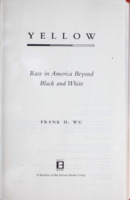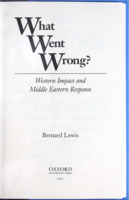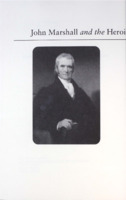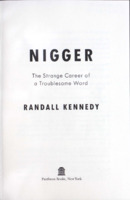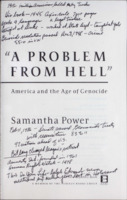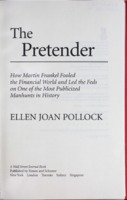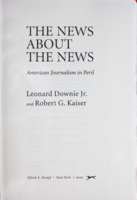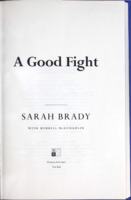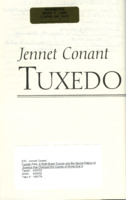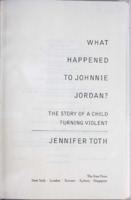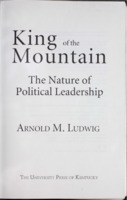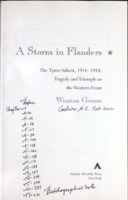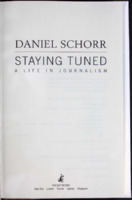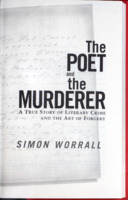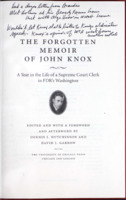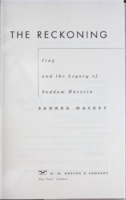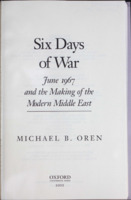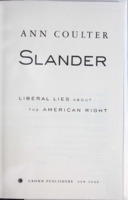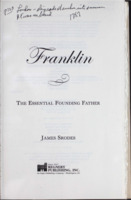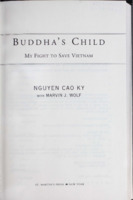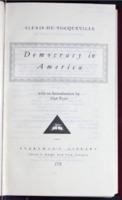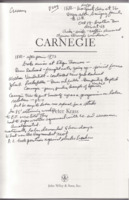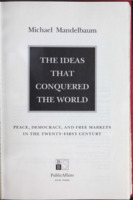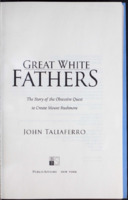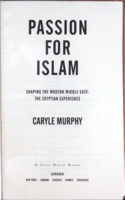Search
540 items
-
Yellow : race in America beyond Black and white
Discussion of how changing ideas of racial identity will affect race relations in the twenty-first century in the context of affirmative action, globalization, immigration, and other issues. -
What went wrong? : Western impact and Middle Eastern response
For many centuries, the world of Islam was in the forefront of human achievement - the foremost military and economic power in the world, the leader in the arts and sciences of civilization. Christian Europe, a remote land beyond its northwestern frontier, was seen as an outer darkness of barbarism and unbelief from which there was nothing to learn or to fear. And then everything changed, as the previously despised West won victory after victory, first on the battlefield and in the marketplace, then in almost every aspect of public and even private life. "In this volume, Bernard Lewis examines the anguished reaction of the Islamic world as it tried to understand why things had changed, how they had been overtaken, overshadowed, and to an increasing extent dominated by the West. Lewis provides a fascinating portrait of a culture in turmoil. He shows how the Middle East turned its attention to understanding European weaponry and military tactics, commerce and industry, government and diplomacy, education and culture. He describes how some Middle Easterners fastened blame on a series of scapegoats, both external and internal, while others asked, not "who did this to us?" but rather "where did we go wrong?" and, as a natural consequence, "how do we put it right?" Lewis highlights the striking differences between the Western and Middle Eastern cultures from the eighteenth to the twentieth centuries with thought-provoking comparisons of such things as Christianity and Islam, music and the arts, the position of women, secularism and the civil society, the clock and the calendar."--BOOK JACKET. -
John Marshall and the heroic age of the Supreme Court
John Marshall (1755-1835) was arguably the most important judicial figure in American history. As the fourth chief justice of the United States Supreme Court, serving during the formative years of the Republic from 1801 to 1835, he helped move the Court from the fringes of power to the epicenter of constitutional government. His great opinions in cases like Marbury v. Madison and McCulloch v. Maryland, cited by the Court thousands of times over the years, are still part of the working discourse of constitutional law in America. Drawing on a new and definitive edition of Marshall's papers, R. Kent Newmyer combines engaging narrative with new historiographical insights in a fresh interpretation of John Marshall's life in the law.."Newmyer unfolds Marshall's early Virginia years - his Americanization in Fauquier County before the Revolution, his decision to fight for independence as "a principled soldier," and his emergence as a constitutional nationalist in the 1780s. Marshall's experience as a Federalist politician and a leading Virginia lawyer during the turbulent partisan decade of the 1790s, Newmyer argues, defined his ideas about judicial review and the role of the Supreme Court as a curb on party-based, states' rights radicalism."--BOOK JACKET. -
Nigger : the strange career of a troublesome word
Nigger is arguably the most consequential social insult in American history. In this book, the author traces how the word has been used and by whom, while analyzing the controversies to which it has given rise. The author explores such topics as how "nigger" should be defined and whether blacks have a right to use "nigger" while others do not. -
A problem from hell : America and the age of genocide
A Problem from Hell is a path-breaking interrogation of the last century of American history. Samantha Power poses a question that haunts our nation's past: Why do American leaders who vow "never again" repeatedly fail to marshal the will and the might to stop genocide? She provides the answer in the form of the suspenseful story of courageous individuals who risked their careers and lives in an effort to get the United States to act. Drawing upon exclusive interviews with Washington's top policymakers, access to thousands of pages of newly declassified documents, and her own reporting from the modern killing fields, Power shows how those who urged U.S. action were thwarted again and again by ignorance, indifference, and, above all, a failure of imagination."--BOOK JACKET. -
The pretender : how Martin Frankel fooled the financial world and led the feds on one of the most publicized manhunts in history
Explains how Martin Frankel, a nerdy financial whiz, created a complex Ponzi scheme that embroiled some of the world's most powerful business leaders and led federal authorities on a bizarre manhunt from America across Europe. -
The news about the news : American journalism in peril
Leonard Downie, Jr. and Robert G. Kaiser - both reporters and editors at the Washington Post for nearly four decades - take us inside the American news media to reveal why the journalism we watch and read is so often so bad, and to explain what can be done about it. "They demonstrate how the media's preoccupation with celebrities, entertainment, sensationalism and profits can make a mockery of news. They remind us of the value of serious journalism with inside accounts of how great stories were reported and written - a New York Times investigation of Scientology and the IRS, and a Washington Post expose of police excesses. They recount a tense debate inside their own newsroom about whether to publicize a presidential candidate's long-ago love affair."--BOOK JACKET. -
A good fight.
The wife of Ronald Reagan's former press secretary describes life with her husband before and after he was shot by John Hinckley, the circumstances that led her to become a gun control activist, and her own battle with lung cancer. -
Tuxedo Park : a Wall Street tycoon and the secret palace of science that changed the course of World War II
Wall Street legend Alfred Lee Loomis, who once owned Hilton Head Island, was devoted to his hobby of science experiments in his mansion. During World War II, Loomis played a key role in the development of radar and the atomic bomb. -
What happened to Johnnie Jordan? : the story of a child turning violent
On an icy night five years ago, Johnnie Jordan - just fourteen years old - brutally murdered his elderly foster care mother, leaving the state of Ohio shocked and outraged. He could not tell police why he did it or even how it made him feel; all he knew was that something inside him made him kill. At the time, few people predicted the swift emergence of a class of young so-called super-predators" - criminals like Johnnie who injure and kill without conscience, personified to the nation by the Littleton, Colorado, tragedy in 1999." "In What Happened to Johnnie Jordan? journalist Jennifer Toth, author of The Mole People and Orphans of the Living once again takes a look at the people in our society whom we so often discard and altogether ignore. As Toth investigates Johnnie's crime and life, she unravels the mysteries of a child murderer unable to identify his emotions even after they converge in acts of fury and rage. In the course of her research, Johnnie grows dangerously into a young man who "will probably kill again," he says, "though I don't want to." Yet he also demonstrates great kindness and caring when treated as more than just a case number, when treated as a human. Through Johnnie's harrowing story, Toth examines how some children manage to overcome tragic beginnings, while others turn their pain, anger, and loss on innocents."--BOOK JACKET. -
King of the mountain : the nature of political leadership
Political leaders govern countries, negotiate treaties, control military forces, and shape economies. Advanced as these activities may seem, however, psychiatrist Arnold M. Ludwig contends that rulers' actions are rooted in the alpha-male behaviors of monkeys and apes.."Profiling every ruler of a recognized country in the twentieth century - over 1,900 people in all - Ludwig establishes how rulers came to power, how they lost power, the dangers they faced, and the odds of their being assassinated, committing suicide, or dying a natural death. Concentrating on a smaller set of rulers for whom more extensive personal information was available, Ludwig profiles the six different kinds of leaders, examining their characteristics, childhoods, and mental stability or instability to pinpoint chief predictors of later political success."--BOOK JACKET. -
A storm in Flanders : the Ypres salient, 1914-1918 : tragedy and triumph on the Western Front
An analysis of a pivotal battle of World War I revisits the four-year-long Battle of Ypres, an engagement that cost hundreds of thousands of lives and forever changed the way war would be waged. -
Staying tuned: a life in journalism
Autobiographical work by journalist Daniell Schorr. -
The poet and the murderer : a true story of literary crime and the art of forgery
Chronicles Mark Hofmann's attempt to forge an Emily Dickinson poem at the end of the twentieth century, and discusses how his deceit and greed undermined some of the most prominent institutions of present-day academia. -
The forgotten memoir of John Knox : a year in the life of a Supreme Court clerk in FDR's Washington
The Forgotten Memoir of John Knox - edited by Dennis J. Hutchinson and David J. Garrow - offers a candid, at times naive, insider's view of the showdown between Roosevelt and the Court that took place in 1937. At the same time, it marvelously portrays a Washington culture now long gone. Although the new Supreme Court building had been open for a year by the time Knox joined McReynolds' staff, most of the justices continued to work from their homes, each supported by a small staff. Knox, the epitome of the overzealous and officious young man, after landing what he believes to be a dream position, continually fears for his job under the notoriously rude (and nakedly racist) justice.But he soon develops close relationships with the justice's two black servants: Harry Parker, the messenger who does everything but breathe" for the justice, and Mary Diggs, the maid and cook. Together, they plot and sidestep around their employer's idiosyncrasies to keep the household running while history is made in the Court." "A foreword by Dennis Hutchinson and David Garrow sets the stage, and a gallery of period photos of Knox, McReynolds, and other figures of the time gives life to this engaging account, which like no other captures life in Washington, D.C., when it was still a genteel southern town."--BOOK JACKET. -
The reckoning : Iraq and the legacy of Saddam Hussein
The reckoning is an account of the forces--historical, religious, ethnic, and political--that produced Saddam Hussein's dictatorship. Iraq was forged after World War I from the Mesopotamian region of the collapsed Ottoman Empire, and its people have never had a national identity or a sense of a common purpose. Hussein, ruling by terror, pitted the various ethnic groups, religious interests, and tribes against one another, and in so doing achieved the destruction of Iraq's middle class and civilized society. After he goes, the country could be the site of conflict even more vicious than the Balkan wars. -
Six days of war : June 1967 and the making of the modern Middle East
Explores the lasting impact six days of intense Arab-Israeli fighting had on world politics, providing information on the conflict's major participants, its causes, and the tragic outcome. -
Slander : liberal lies about the American right
Examines the shaping of political discourse in the United States as it has become increasingly hostile and more trivial, describing how the media's liberal bias has villianized the conservative right and obscured the true issues. -
Franklin : the essential founding father
Biography of Benjamin Franklin. -
Buddha's child : my fight to save Vietnam
Ky served as a general in the South Vietnamese Air Force and as prime minister from 1965 until 1967. -
Democracy in America
Contains Tocqueville's original eighteenth century writings on the American political experience and its effects upon the development of the American culture. -
Carnegie
Explores the life and career of the industrialist who made his fortune in the steel industry, and who was also one of the nation's greatest philanthropists. -
The ideas that conquered the world : peace, democracy, and free markets in the twenty-first century
Continuing in the same tradition as Francis Fukuyama's The End of History, political science professor (and senior fellow of the Council on Foreign Relations) Mandelbaum continues the argument that capitalism and democracy are inextricably linked and that so-called "free markets" have emerged as indisputably triumphant in the world of contesting political and economic ideas. In exploring the political affairs of the United States, Europe, the Middle East, Russia, and China, he advances two propositions about liberal democracies that may seem surprising to observers of the current international scene: that democracies tend to conduct peaceful foreign affairs and that free markets naturally lead to democracy. One of America's leading foreign policy thinkers offers a major new statement about global politics in the 21st century, and shows how prevailing trends are remarkably favorable to the United States and the nations of the West. -
Great white fathers : the story of the obsessive quest to create Mount Rushmore
The story of how Rushmore was conceived and built, and why controversy surrounded the project from the start. Great White Fathers is about the meaning of public art, the rise of automobile tourism, and the development of kitsch culture. At its center is Rushmore's feisty sculptor Gutzon Borglum, who waged an energetic campaign on behalf of his artistic vision and then carved the faces of four presidents into a mountainside. -
Passion for Islam : shaping the modern Middle East : the Egyptian experience
Discusses Egypt's role in the growth of Islamic extremism.
